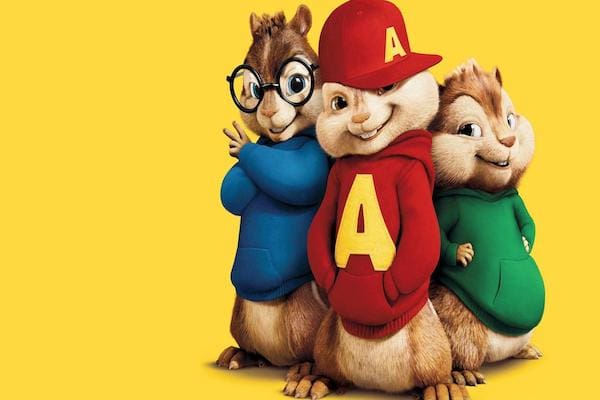No work of art, history, academia, or public storytelling could better capture the deep vacuum of public life in the 2000s than Alvin and the Chipmunks (2007). The anodyne tale of Alvin, Simon, and Theodore, crisply contained to a tight ninety-minute timeframe, managed to turn a $60 million budget into a healthy $360 million box office take – the 14th highest in the world for 2007. Its three squeakuels have only grown the pie – 2011, the year of Alvin and the Chipmunks: Chipwrecked’s release, saw the franchise take in $300 million on merchandise alone. The numbers expose the brilliance of the Chipmunks grift. Alvin and his brothers’ on-screen antics exist, functionally, as a ninety-minute advertisement for the Alvin and the Chipmunks brand. But the Chipmunk juggernaut did not come from nowhere; it exists as a symptom of the 2000s cultural cringe.
The cultural cringe of the noughties was a chiefly American phenomenon. Americans were promised the end of history, and the dominance of their nation and ideology on the world stage. Instead, they were given the national trauma of 9/11, seemingly endless wars abroad, economic collapse at home, and a rapidly deteriorating political consensus. The idea of what it meant to be American changed, and their national confidence was brought into doubt. This nationwide ennui, fused with the market logic of neoliberalism, led to a fairly straightforward formula for commercial success in film: provide people some respite from the world they live in, set up a merchandising line, and keep it G-rated. Meaning, joy, and humour, all became secondary to creating as inoffensive a cinematic experience as possible. Moviegoers could trust that their ticket at the box office would buy them an hour and a half of scorching nothingness, leaving them untroubled, and with a burning desire to purchase Alvin and the Chipmunks merchandise for their friends and family.
What made Alvin and the Chipmunks such a trailblazer in this field was its advent of soft, cuddly heroes. The character design of the CGI chipmunks is seemingly made for their future franchising as soft toys. Theodore, in particular, has little to offer to the film than a huggable-ness suited to a future as a cheap stocking-stuffer present from an unloving parent. This form of movie mascot, that comedian Conner O’Malley describes as “irresistible to toddlers, to want to watch and hold and put in their mouth” was created with Alvin and the Chipmunks, but perfected by Despicable Me’s Minions. Soft, cuddly, visually distinctive, and endlessly marketable, Minions carried the cuddly mascot banner into the 2010s. While Alvin’s star has begun to fall (the most recent film, The Road Chip, released in 2015, saw a box-office take of only $234 million – the lowest yet), the Despicable Me franchise has only risen in popularity. Minions, the spin-off film that dispatches entirely with any semblance of character, cracked $1 billion at the box office alone.
With a sequel to Minions slated for a 2021 release, and the recently-spawned Trolls franchise setting several streaming records with its second film this year, it looks like the legacy of sterile, joyless, children’s toy film franchises is set to continue. Of course, there are worse things to happen. There’s nothing particularly offensive or off-putting about these films – I actually quite enjoy Despicable Me – and even those who are looking for more substantive content can find it elsewhere. But still, watching David Cross flatly talk to CGI chipmunks, one can’t help but hope for something a little more daring, something a little less profit-minded. But sadly, a reprieve from the market dominance of the soft cuddly mascots does not seem near.
While the 2000s brought American self-confidence into doubt, the successive traumas of 2020 have shaken far deeper, foundational assumptions about American society. As the traditional film release-to-lunchbox decoration pipeline grows less and less profitable due to a contracting economy and social distancing restrictions, the ongoing viability of the formula grows less and less certain. A shift to new media as source for entertainment seems on the horizon; perhaps it won’t be long before we see Minion TikToks, or an Alvin Netflix series. However far we may move – culturally and technologically – from the 2000s, we can be sure that the cultural cringe is far from over.





